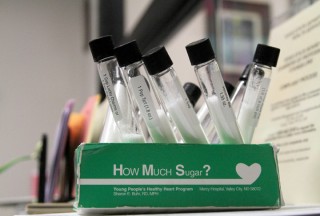
Matt Hellman | Lariat Photo Editor
By Jordan Hearne
Reporter
Study sessions filled with sweetened drinks and sugary snacks might make grades crash.
When preparing for exams and spending hours in the library, many students consume unhealthy levels of sugar. Regina Mastin, dietician at Baylor’s Counseling Center, explained that when students order certain drinks from coffee shops in order to stay awake, they are really consuming high-calorie beverages loaded with sugar.
In addition, if students stay awake from sugar and caffeine and do not get enough sleep, they are more likely to give in to cravings for sugar-laden candy and soft drinks that are nearby.
The cyclic cause of sugar cravings and over-indulging in sweets stems from blood sugar levels.
Mastin said that when people do not eat every three to four hours, their blood sugar levels dip, causing them to want sugary foods that give a fast energy fix. After consuming a high dose of sugar, blood sugar levels rise for a short amount of time, and then crash, sending a person on another hunt for even more sugar.
“It is too easy to go to a vending machine,” Mastin said. “People are replacing things like fruits and veggies with a soda and a candy bar.”
Soft drinks are not the only culprits for added sugar in popular study areas. Van Smith-Davis, assistant director of campus recreation and fitness, said that sports drinks contain extra sugar and electrolytes that are not necessary unless the drinker has just completed an endurance event exceeding an hour and a half.
“For an hour or hour-and-a-half activity, water is sufficient,” Smith-Davis said. “If you’re going to drink something, look at the sugar content.”
Added sugar is a component of many foods consumed daily, such as cookies and non-diet sodas. When people consume high levels of this additive, the health effects can be dangerous.
Mastin said that in an average adult, too much sugar intake can lead to heart disease, obesity, chronic illness and Type 2 diabetes. In addition to long-term illnesses, students’ grades and classwork can also suffer as a result of eating or drinking too much sugar.
“Sugar can affect mood, and students might not be able to concentrate as well when they are studying,” Mastin said.
According to the website for the dietary guidelines of Americans, health.gov, the amount of calories in sugar and the amount of sugar in some foods can lead to weight gain and a lack of proper nutrition from foods that are overly processed.
Mastin said that the best way to avoid added sugar is to know what to look for in labels.
She said there isn’t a specific number to look for on nutrition labels and use as a guide for monitoring how much added sugar is in a product because many foods have sugars that occur naturally in the product.
“The best thing to do is to look at the ingredients,” Mastin said. “You don’t want sugary substances to be one of the first five ingredients listed.”
The health.gov website has a complete list of names for refined sugars, including high-fructose corn syrup, glucose and fructose.
In diet, moderation is key, and Smith-Davis emphasized the importance of balancing water with sodas.
“If you’re not drinking five or six or seven a day, grab a soda. It’s fine,” Smith-Davis said. “Studying all night and relying on caffeine and sugar from multiple sodas is not good for the body.”
When studying, she suggested walking and getting exercise for 10 minutes to boost energy, and Mastin recommended bringing pre-packed snacks of dried fruit and nuts to fend off sugary cravings.



